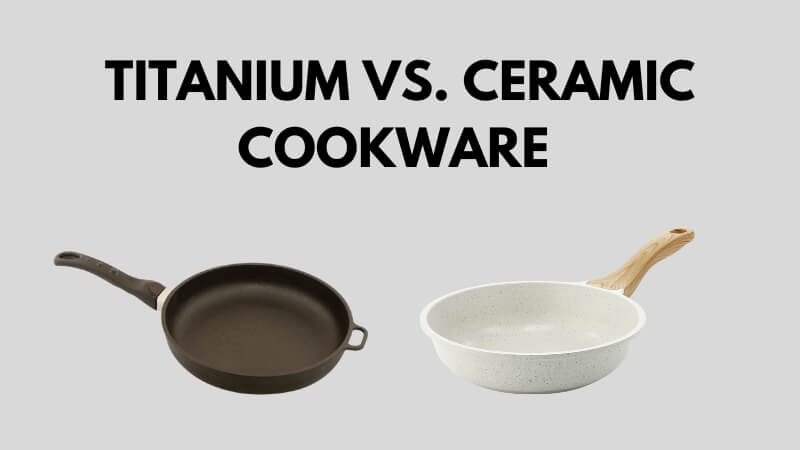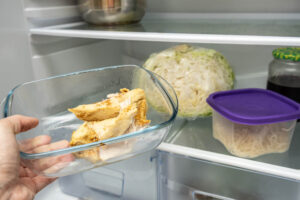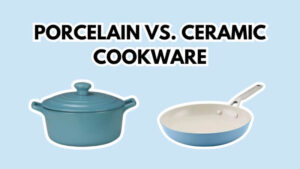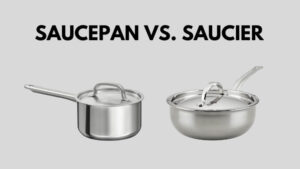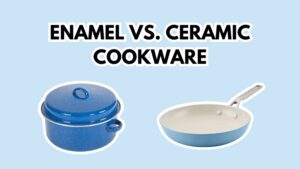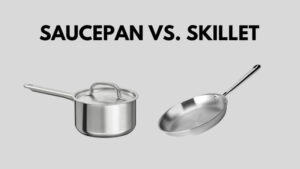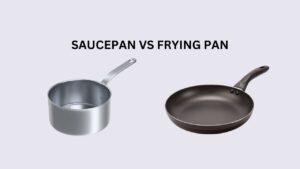When it comes to cookware, titanium and ceramic are two materials that often spark debate among home cooks and chefs alike. They’re beneficial in their own ways, but it is possible to determine the better one for yourself once you know the main titanium vs ceramic cookware differences. Read on to get your answer to what’s better, ceramic or titanium cookware?
How to distinguish titanium and ceramic material?
It is not always easy to differentiate titanium vs ceramic cookware, but there are a few signs you can look for.
| Titanium Cookware | Ceramic Cookware | |
|---|---|---|
| Weight | Light | Heavy |
| Color | Subtle silver | Wide range of colors |
| Texture | Smooth with a sheen | Smooth, matte, or slightly textured |
Titanium cookware typically has a shiny, sleek appearance. The color is often a subtle silver. Another way to identify titanium is by its weight. Titanium is known for being lightweight, so if the cookware feels light but still sturdy, it is likely made from titanium. If you’re contemplating titanium coating vs ceramic coating pan, look at the surface carefully. The titanium one is smooth and has a sheen.
Ceramic tends to be heavier than titanium, so if the pan feels solid and a bit weighty, there is a good chance it is ceramic. Ceramic cookware tends to come in a wide range of colors, and it often has a glossy finish. Unlike titanium, the surface is not always smooth. It is sometimes matte or slightly textured.
Now that you know how to tell titanium vs. ceramic cookware, let’s take a look at what users are saying about each material, particularly in regards to safety. You will find the answer to is ceramic/titanium safe for cooking, among others.
Users’ feedback for titanium vs ceramic cookware
Titanium cookware
A lot of people appreciate how easy titanium cookware is to handle, especially on the go. For backpackers and campers, it is preferable to ceramic cookware. Additionally, titanium pots or pans are more resistant to wear and tear. They can last for a while, even with heavy use.
But most, at least on Reddit, agree that titanium cookware is not ideal for most tasks beyond boiling water. As a highly heat-conductive material, it speeds up the process well but usually burns and sticks food to the surface. Uneven cooking is common, although being quite easy to clean offsets this issue slightly. The same goes for titanium-coated cookware. It is best to avoid it when a recipe calls for precise temperature control.
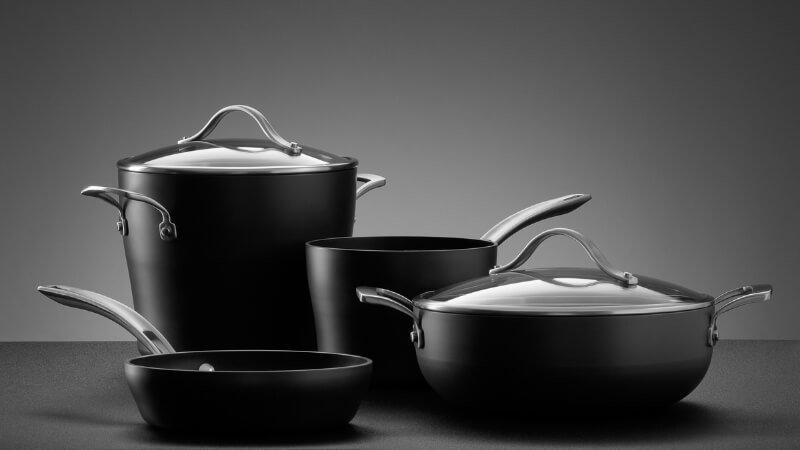
Ceramic cookware
Ceramic and ceramic-coated cookware are often praised for their non-stick properties, which translates to hassle-free cooking and cleaning. If you’re not a fan of scrubbing pots and pans (Who is, really?), you will love this about ceramic cookware. However, if it is not handled with care, it can lose its non-stick ability. Make sure you don’t clean it with anything abrasive, like steel wool.
Ceramic cookware is usually more colorful. If you like to match your cookware with the decór of your kitchen, you get more choices with ceramic. Though titanium cookware’s subtle silver can fit a modern space, it might not suit your bold or bubbly personality. You can make your kitchen truly yours with ceramic cookware. It is also great if you’re deciding between titanium vs ceramic cookware for gifts.
Read more: Granite Cookware vs Ceramic Cookware: Which is Better?
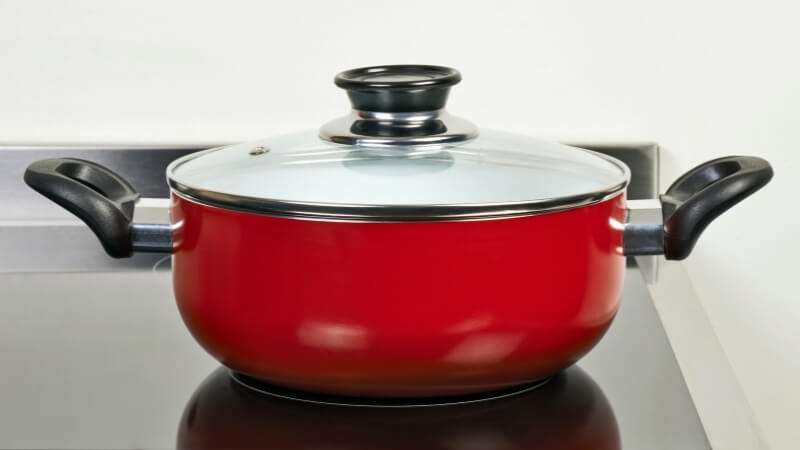
Is ceramic/titanium safe for cooking?
Generally, ceramic cookware is considered safe for cooking. Most ceramic coatings are free from harmful chemicals, like PTFE and PFOA, so they are a popular option for those seeking non-toxic cookware. It is also considered environmentally friendly.
However, the safety of ceramic largely depends on the quality of the coating. Cookware with low-quality coatings can degrade faster and expose the material underneath, which is not as safe for cooking.
Titanium cookware is also regarded as safe, mostly because titanium itself is a non-reactive metal. This means it will not leach into food or react with acidic ingredients. But it is essential to note that most titanium cookware is not made entirely of titanium. Typically, it is aluminum or stainless steel with a titanium-infused coating. As with ceramic-coated cookware, the level of safety depends on the integrity of the coating.
Therefore, regardless of whether you go with titanium vs ceramic cookware, you must make sure your chosen product is of high quality. Moreover, you need to use it properly to maintain its safety over time.
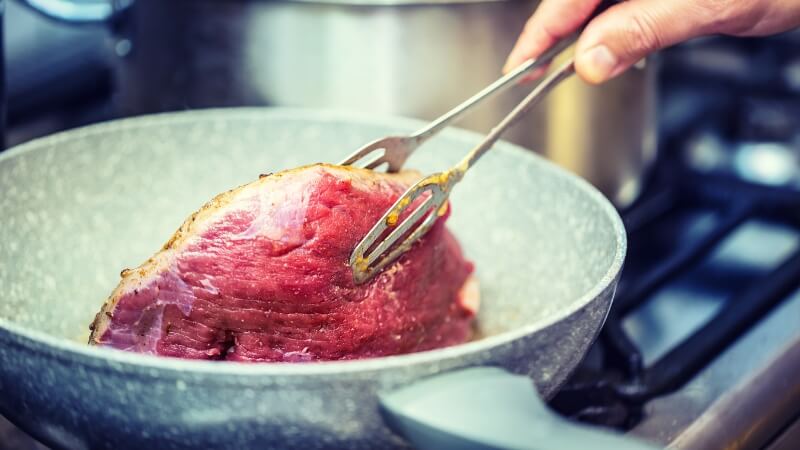
Tips to prolong both lifespans
To get the most out of your cookware and ensure they remain in excellent condition for years to come, keep the following tips in mind.
Titanium utensils
- Titanium cookware heats up quickly, so there is no need to use high heat, which can damage the coating over time.
- Stick to silicone, wooden, or plastic utensils to prevent scratching the surface.
- Although many titanium pans are labeled dishwasher-safe, it is always best to hand wash with mild detergent.
- Allow the cookware to cool completely before washing to avoid warping or weakening the coating.
- Use pan protectors between stacked pans to avoid damage.
Ceramic utensils
- High heat can cause the ceramic coating to deteriorate faster. Stick to low or medium heat for most cooking tasks.
- Use silicone, wooden, or plastic utensils to prevent chipping or scratching.
- Hand washing with a sponge preserves the surface better than the dishwasher.
- Ensure the cookware is fully dry before putting it away. Otherwise, moisture can build up and weaken the coating.
- Aerosol cooking sprays can leave a residue that degrades the surface over time. Use a small amount of oil or butter instead.
Conclusion
Ultimately, determining whether titanium vs ceramic cookware is better comes down to your cooking needs, preferences, and priorities.
Titanium cookware is known for being lightweight, durable, and resistant to wear and tear, so it is perfect for simple tasks like boiling or fast cooking. On the other hand, ceramic cookware is lauded for its non-stick capabilities and wide range of colors. It is great for those who value safety and style.
Both have their strengths and weaknesses, but with proper care, they can serve you well for years. Now that you know the key titanium vs ceramic cookware differences, you can make an informed decision for your kitchen.

